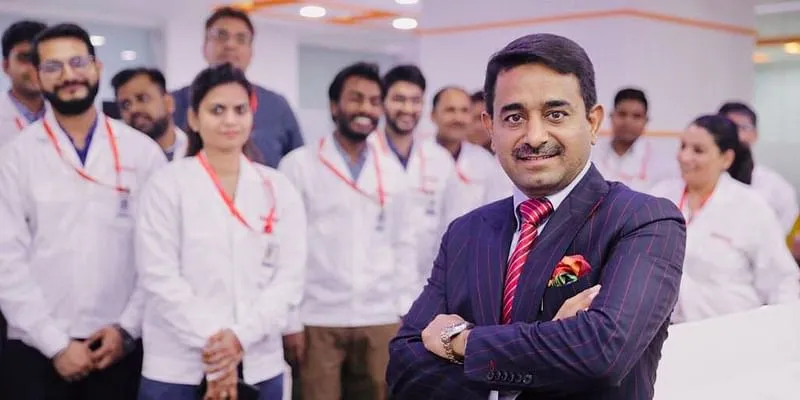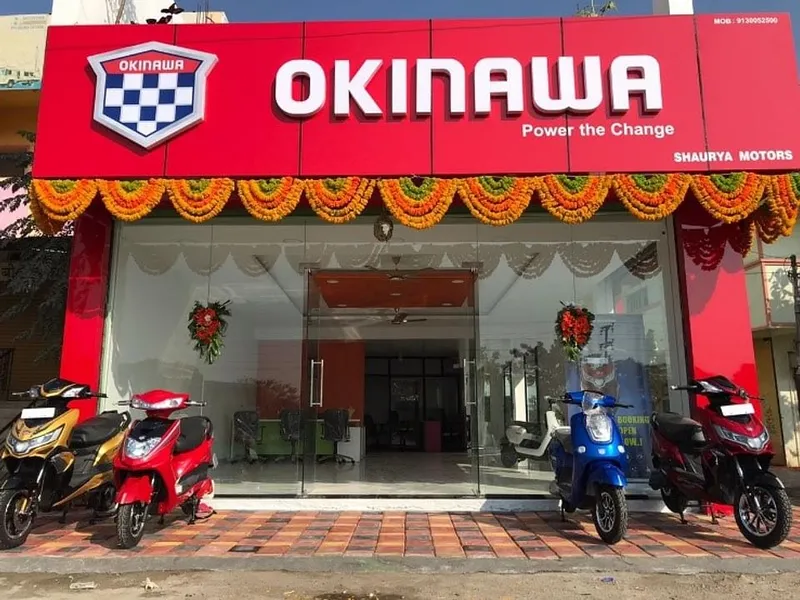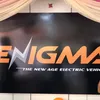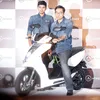This engineer built a popular high-speed electric scooter brand, outselling Ather, Hero Electric
A trip to Okinawa Islands in Japan inspired Jeetender Sharma to start Okinawa Scooters in Gurugram in 2015. Today, the business has over 60,000 electric scooters on road.
While working with Honda Motorcycles and Scooters as an Operations Head, Jeetender Sharma visited the Islands in Japan. Residents of the islands are known to have among the longest life spans in the world. The archipelago also boasts the highest rates of centenarians.
Jeetender, who is a Mechanical Engineer and a PG Diploma graduate in International Business, felt the islands’ zero-pollution environment played a major role in boosting the health of its people.
“This experience inspired me to start a venture to contribute to an eco-friendly environment in India. I decided to set up an electric vehicle (EV) company to replace the use of conventional fossil fuels with clean energy, thereby reducing pollution,” Jeetender tells SMBStory in an exclusive interview.

Okinawa Scooters founder and MD Jeetender Sharma
Having worked for almost 25 years in the automobile production and quality assurance departments, Jeetender put his domain expertise to use and started an electric two-wheeler business in Gurugram in 2015. Paying tribute to the archipelago that inspired him, he named his company Okinawa Scooters.
“We spent the first two years in research and development. In 2017, we launched our first product — the Okinawa Ridge. Since then, we have launched seven different electric two-wheelers, and have captured the highest market share in high-speed electric two-wheelers in India. We have over 60,000 of our two-wheelers on the road right now,” he says, with the claim also recently reported by Autocar Professional.
According to the report, Okinawa sold over 10,000 units in FY2020, Hero Electric sold 7,399 units, and Ather clocked 2,908 units.
In an exclusive interaction with SMBStory, Jeetender describes his successful business strategy and explains how Okinawa is looking to overcome the challenges of EV adoption in India.
Edited excerpts from the interview:
SMBStory [SMBS]: Consumer mindset can be a challenge for EV adoption. What initial challenges did you face?
Jeetender Sharma [JS]: Okinawa Scooters was a new idea in 2015, and I was wondering how to finance it. When I shared the concept with my friends and family, they were in support of it, and some of them came forward to invest in the venture. We didn’t take any external investments in the company.
When we did our market research, we found the lack of charging infrastructure was a major concern among potential EV buyers. Market sentiment was low and hesitation among buyers was prominent enough. Our first priority was to break the related myths, and gradually change the mindset of people.
We started working towards building a solution to address these concerns. Soon, we launched electric scooters that came with detachable Li-ion batteries, which enabled buyers to charge their scooter batteries anywhere and at any time.
This solution impressed buyers and helped us widen our market footprint. However, the consumer mindset continues to be a challenge. All transitions take time, and so will this shift towards EVs.
SMBS: How did you build your product portfolio?
JS: We started offering products varying from low-speed to high-speed electric scooters. Over the years, we widened our range from lead-acid to Li-ion battery-equipped variants. At present, we have our first electric motorcycle in the pipeline. It will be a high-speed motorcycle which will be 100 percent Made in India.
We manufacture and sell our products through our network of over 350 dealers across India. Our business strategy revolves around innovating the products to offer maximum localisation and high quality. We aim to achieve rigorous technological advancements, which is the demand of the market.

Inside Okinawa's manufacturing unit
SMBS: Where do you manufacture your electric two-wheelers?
JS: Our manufacturing plant is in Khushkhera Alwar, Rajasthan. We are also planning to open a new facility soon in the state which will increase our capacity.
At our facility, we make electric scooters equipped with indigenously-developed IP’s such as detachable Li-ion battery, microprocessor controller, permanent magnet BLDC motor, and other features such as mobile charging, keyless start, app connectivity, among others.
SMBS: EVs are generally considered to be costly. What is your pricing, and who is your target audience?
JS: The pricing of our electric two-wheelers starts from Rs 59,000, and goes up to Rs 1.09 lakh. We are getting a good response from across Tier-I, II, as well as Tier-III cities.
To our surprise, we received an overwhelming response from Tier-II cities. We are aggressively working towards penetrating Tier II and III markets as a part of our retail strategy. We are also working towards providing purchase financing options to our buyers.
SMBS: How is the company using digital platforms for sales/marketing?
JS: Our marketing team is working towards breaking the myths related to EVs among buyers. To amplify this communication, we are aggressively utilising social media platforms. The idea is to reach our target audience directly through interactive platforms. Also, from a product perspective, we are promoting through Google AdSense campaigns and others.
SMBS: What were the key milestones in Okinawa’s business journey?
JS: Our first milestone was when we became the first manufacturer to get FAME-II approval in the electric two-wheeler segment, which added a lot of credibility to our brand. Our second milestone was in 2018 when we organised a ride on our e-scooter iPraise from Gurugram to Khardung La pass in Ladakh, which is the highest motorable path in India.
The scooter went to a height of more than 18,000 feet. Our ambition to prove that EVs are at par with internal combustion engine (ICE) vehicles motivated us to organise this ride.
SMBS: The Indian EV space is heating up, and a lot of new entrants are emerging. How are you staying ahead of your competition?
JS: It’s true that over the last couple of years, our EV industry has witnessed several noted players entering the space. However, it is not about competition in the EV space. Everyone, including startups and established auto giants, are still exploring it. The foundation is yet to be strengthened, and I feel the market size is quite big and there is room for everyone in it.
Hence, right now, it is more about collectively working towards changing the buyer’s perception, and building an infrastructure that is strong enough to accelerate the demand and supply of EVs within the domestic market.

An Okinawa dealership
SMBS: With the COVID-19 pandemic affecting businesses worldwide, what are your future plans?
JS: COVID-19 has not only impacted the EV market but also industries across sectors. EV players that import parts or CKD (Completely Knocked Down) units from China will face challenges. However, we offer over 90 percent localisation, and hence, it is not a big challenge for Okinawa.
Once things are back to normal post the lockdown, people will prefer to own vehicles for safety reasons. This is expected to boost EV sales in the market.
Meanwhile, we have been supporting our dealers and expanding our network across India. We hiked our dealers’ margins to help them make more profits in these difficult times. We are accelerating our marketing activities as things gradually improve in the markets.
Further, we will be launching our first electric bike — OKI 100 — in the third quarter of this fiscal year. It will have a detachable Li-ion battery and have a speed of 100 km/hr, with a range of 150 to 160 km per charge.
Edited by Suman Singh






![[India MSME Summit 2021] ‘Koshish kar, toh hal niklega’: What MSMEs need to do to get out of the COVID-19 depression](https://images.yourstory.com/cs/21/f49f80307d7911eaa66f3b309d9a28f5/Image40o1-1624777386232.jpg?mode=crop&crop=faces&ar=16%3A9&format=auto&w=1920&q=75)



